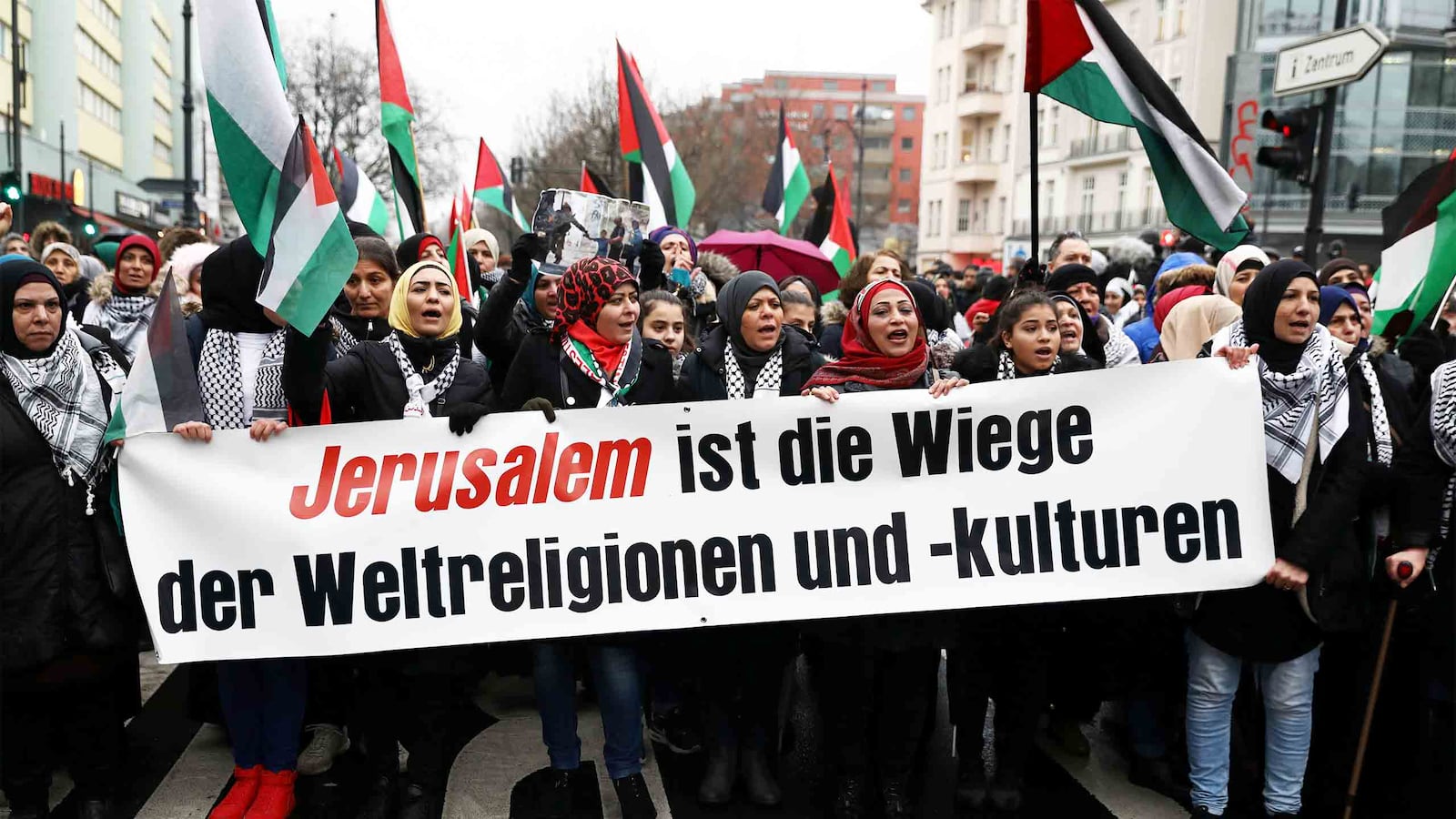OFFENBACH, Germany—Rabbi Mendel Gurewitz, who was born and raised in Crown Heights, Brooklyn, has been running the synagogue in Offenbach, a city outside Frankfurt, for the past 20 years. It’s not the Big Apple, but he likes it here.
Three years ago, Gurewitz went to buy diapers for his baby at the city’s faded gray shopping center, where he was confronted by a group of teenage boys who shouted racial slurs and “viva Palestine” at him while the other shoppers did nothing.
A few months later, when the boys trundled into his synagogue hoping to get the charges against them for insult and physical injury dropped, they had some questions they wanted clarified about Jews in this country.
“It was like they thought there were dollar bills in our eyes,” Gurewitz told The Daily Beast. “And they thought that Jews don’t have to pay taxes in Germany.“
Today, the 43-year-old rabbi just wants to do his job as a man of God. The shopping center was not the first or last time he has encountered the kind of ugly stereotype that, having originated in Europe, now seems to be fueling new versions of anti-Jewish sentiment across the continent as well as in the U.S., from the George Soros caricatures that permeate the advertising space in Hungary’s no longer free media to the Turkish president’s various “us against the world” conspiracies.
There are growing concerns that anti-Semitism is on the rise, and in this atmosphere of fear Gurewitz has members from his congregation coming up to him after services telling him that the anti-immigrant Alternative für Deutschland party is trying to recruit them.
This is grim, ironic opportunism. Just a year ago one of the AfD’s politicians in this same region declared that the Central Council of Jews in Germany secretly controls the entire country. Now, says Gurewitz, “I know they tried to reach out to Russian members from our community by pretending that they are pro-Israel and for the Jews.“
THE HATE SLOGANS in Germany that greeted U.S. President Donald Trump’s decision last month to move the U.S. Embassy in Israel to Jerusalem put the spotlight on anti-Semitism in Muslim immigrant communities, which certainly exists. But they also showed that the real-life tensions between Jews and Muslims offer an opportunity to the far right to rationalize its Islamophobia and downplay its historical anti-Semitism.
Last month, some Muslim refugees in hoodies threw Molotov cocktails at a synagogue in Gothenburg, for example. Bad enough. But a certain “Swedish journalist“ has been tweeting about supposed subsequent but in fact nonexistent bomb attacks and offering “my deepest condolences to the Jewish people.” His comments were widely retweeted—he has 82,000 followers. But, in fact, the 22-year-old previously has denied the Holocaust and said, memorably, that “Hitler had some good points.“ And he is not even Swedish, as the U.K. charity Hope Not Hate found out this summer. He is an Englishman from North Yorkshire.
In Germany, the footage of protests in Berlin after the Jerusalem embassy announcement was just the kind of thing AfD recruiters on the German right are likely to exploit. Calls of “Tod Israel” (Death to Israel) filled the air, and several people set fire to homemade Israeli flags 100 yards from a Holocaust memorial. Cameras captured the Middle Eastern-looking young men who were sitting on each other’s shoulders and chanting in the wind so that they appeared to be spurring the energy of the entire crowd. (Ten people were arrested, mainly for covering their faces.)
Even in a Muslim or Middle Eastern context, it is somewhat surprising that the Jerusalem issue pulled together disparate and often mutually hostile groups. Only some had Palestinian heritage, while others included Turkish nationalists and Hezbollah fans. Some people were waving Syrian flags.
There hasn’t been a lot of research on anti-Semitism among Germany’s Muslim population (or, for that matter, among the majority population). But it’s not just about hand-me-down prejudices and propaganda.
Anti-Israel sentiment shading into anti-Semitism has branched out into other parts of German culture, where there is little or no innate interest in Palestine, Jerusalem, or Islam.
One of those areas is gangsta rap, a fairly recent phenomenon in Germany.
“Palestine, the region where Muslims are being treated badly by Western forces, is like a magnifying glass,” said the music producer Marcus Staiger, who describes himself as a left-wing radical and is credited as one of the early leading lights of German street rap. For second- or third-generation immigrants who feel like outsiders in German society, he told The Daily Beast, Palestine is the underdog with which they may choose to identify.
Ben Salomo, who, at the age of 40, has gotten used to being the only Jewish rap artist at any given rap battle, said solidarity for Palestine “is mainstream, is fashion.” In one incident he recalled, a groupie tried to get a bigger star’s attention backstage by pointing at him and shouting, “Look, look. That’s the Jew.”
“He [the other rapper] came very close to me like he wanted to hit me and then he was like: ‘Joke, joke,’” Salomo told The Daily Beast. “It wasn’t a joke, but one still laughs.”
THERE IS A SENSE of anti-establishment defiance in the tracks that certain rap artists have dedicated to Palestine and in the phrases where they name-drop the region (“He is hit while he throws the stone / he screams his last words loud: freedom”). But if you really want to style yourself as a rebel with a cause, then, along with occasional allusions to violent jihad (“We don’t talk long, you will be bombed”), going to war with Israel in your songs (“c’est la vie / I will do an attack like Tel Aviv”) is an effective way to be provocative.
Some of Berlin’s esteemed newspaper columnists and a Green Party politician once chastised the so-called first German gangsta rapper, Bushido, for being a bad “role model” of integration (his father is Tunisian). He had posted a map as his Twitter profile picture that showed a blank space where Israel is supposed to be. The image is used as propaganda by Hamas and extremist Palestinian organizations who deny Israel’s right to exist. But Bushido was not about to take it down. He’s had that profile picture for five years now.
Perhaps this proved inspirational to the baby-faced dyed-blond rap artist Kollegah, who kicked off his rap career by posing as a young Hugh Hefner in a silk robe while two women draped themselves over the hood of a car (“Hey, move aside, you slut / I am the big boss in the silk robe”). His stepfather is Muslim, and Kollegah, 34, converted when he was 15. Last year he grew a beard and flew to Ramallah because he wanted to shoot a documentary there for his YouTube channel.
In the resulting video, Kollegah, whose real name is Felix Blume, appeared uncharacteristically self-conscious walking around a crisis zone in a T-shirt that read “Deus Maximus,” his eyes darting about while he handed out cash and tried to control every conversation for the camera.
It was a far cry from the song he would record back home, called “Legacy,” in which he dares his critics to “Turn me into an anti-Semite because I help Palestinians / In whose home it looks like a Vietnam War zone.”
For Kollegah, who has also rapped about his “Jewish lawyers,” the Palestine film was about establishing a new kind of street credibility, according to Staiger. And judging by the outrage in the German media, as well as some of the disturbing resonance from his fans, “He is clearly hitting a nerve with his audience.“
TRADITIONALLY—AND WHEN we aren’t talking about right-wing extremists—it’s been left-wing radicals who slander Israel as the new “Third Reich” or conflate negative stereotypes of Jews with those of capitalism per se, and who have been accused of fostering anti-Semitism.
But today in Germany, the radical left is failing to stay socially relevant and mobilize young people, who perceive them as inhibited, intellectually snobbish, and caught up in a linguistic showdown over, for instance, gender marking.
And then there is the “Youth Resistance,” a gang of bomber-jacket-wearing German men in their mid-20s. Their members sometimes prowl around Berlin looking to set fire to drinking haunts they don’t like, scrawl “armed and ready” on the walls of freshly renovated apartment buildings, and beat up other left-wing radicals who may also want to “Fuck the U.S.” but don’t hate Israel, too.
So when the Israeli flags were being burned at the Brandenburg Gate last month, the Youth Resistance was right there, shouting amid the angry crowd, and the police made sure to keep an eye on them (indeed, they are generally under police surveillance).
The Youth Resistance leader, who goes by the alter ego of Taktikka, may be the only part-time musician in Germany to describe himself as a “proletarian rapper.” Taktikka appears in his pictures with a cloth tied over his mouth; his music videos are a mash-up of riot porn and a burning American flag. He doesn’t want to give his real name, and in the typical fashion of the German far left, he will only answer questions in writing.
He told The Daily Beast that he is inspired by German street rap, by the “authentic people from the Volk,” who “give the youth of the German proletariat a voice.”
The Kurdish German rapper Haftbefehl as a teenager used to deal drugs in Offenbach, the same city where Rabbi Mendel Gurewitz lives. The rapper, whose real name is Aykut Anhan, dismisses the German street rap genre as “crap” and now lives with his mother in a calmer part of town. He once wrote the line, “I sell cocaine to the Jews from the bank,” which he says is not anti-Semitic because it is just stating the fact of what he used to do.
Rabbi Gurewitz is skeptical about the way Haftbefehl talks about Offenbach: a “terrible” place where “every second person at the train station carries a knife,” according to the rapper. “This is not really true,” said Gurewitz.
But Taktikka of Youth Resistance, for his part, is a fan of Haftbefehl’s energetic and macabre work: “I like to listen to his music when I’m doing martial arts or weight training.”
Since Taktikka and his gang moved to the capital to shed their suburban upbringing for the sake of the anti-imperialist struggle, they also have boxer haircuts and like to go to the gym.
According to another activist on the scene, they are “trying to make their politics ‘swaggy,’” by which he means edgy and avant-garde in a way that will thrill the kids who think that Marx is pretentious and gangsta rap cool. At the expense, it would appear, of Germany’s Jewish community.






